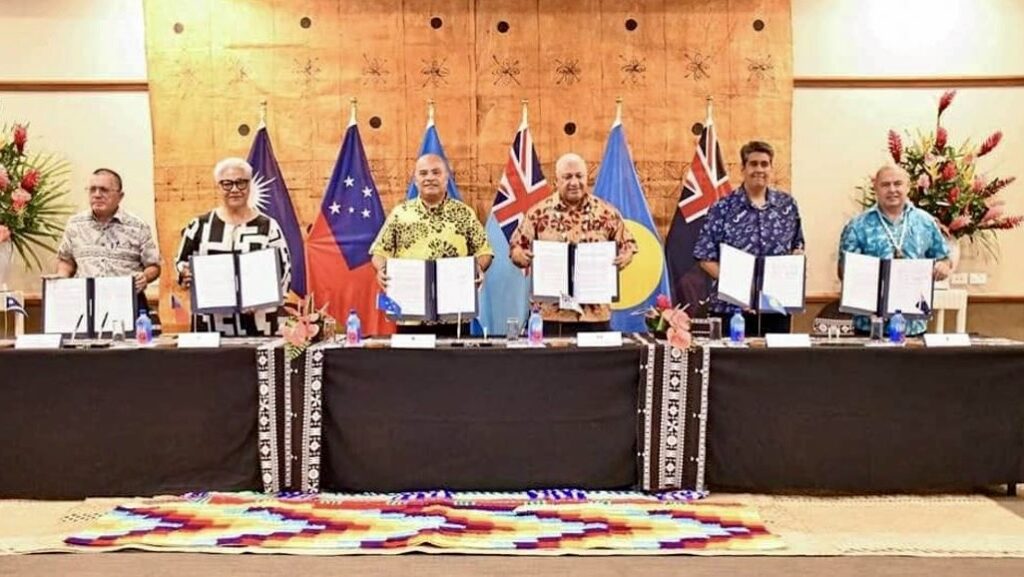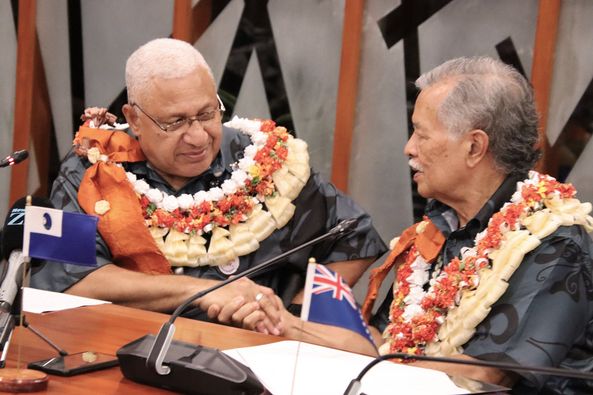
by Steve Sharp
On the 8th July, Pacific Islands Forum Secretary General Henry Puna addressed PIF foreign ministers and acknowledged ‘the considerable efforts and leadership shown by the Government of Fiji’ since it became Forum Chair in August last year. He made special mention of its ‘single-minded effort to keep our family united’.
A few days later, as the 51st forum meeting in Suva was due to start, news seeped out that the Republic of Kiribati had given written notice it was withdrawing from the forum after 45 years.
Despite the Secretary General’s formal language about protecting ‘the sanctity of our solidarity…as the Blue Pacific Continent’, first-time delegates might have come away thinking that ‘Pacific family’ was becoming an over-used political metaphor. They may have learnt to be especially wary of pre-forum media releases with titles like: ‘Micronesia Almost Certainly to Remain in Pacific Islands Forum’.
The ‘shock’ announcement confirmed that Kiribati was making good on its threat to leave the forum, first flagged in February last year as a Micronesian breakaway of five island states. The withdrawal was reported to have thrown the region’s premier political body into crisis.
But crisis is relative and the emergency diplomacy led by Forum Chair Fiji in early June to stave off a Micronesian walkout went ahead without a Kiribati representative. And yet, the meeting still produced the so-called Suva Agreement, announced with great optimism, reported faithfully by the world’s media as a done deal, but not worth the paper it was printed on. This was because Kiribati never signed it and its delegation was, in any event, a no-show at the annual meeting last month where it was due to be ratified.
For those new to Pacific diplomacy there are hard lessons here. For those of us who have observed these processes over time, there is a familiarity where media reporting tends to project its own wishful thinking onto opaque political machinations. Official secrecy and dysfunctional media-government relations meant that i-Kiribati citizens knew nothing of the impending exit, just as Solomon Islanders last April were the last to know their government had inked a security agreement with the People’s Republic of China.
When the Suva Agreement was drip-fed to the news media in June, most outlets accepted that diplomatic urgency had won out and averted a scenario where the Forum meeting would morph into a farewell to a quarter of its membership.
But journalists forgot to ask for details such as: agreement between whom exactly? And who actually attended the June meeting? If only three Micronesian nations (FSM, Marshall Islands and Palau) out of five were represented, what were the prospects of having all five members on board? And what happened to the Micronesian Presidents’ Summit sub-regional group that was managing the membership negotiations?
The misreporting of the Suva Agreement as a done deal is in some ways typical of how feel-good endings (the family stays together) are often at odds with Pacific realpolitik. Information was released in a way that promoted the falsehood that the Micronesian states were working as one and had no consequential differences. The Forum Chair Fiji and its PM Frank Bainimarama must accept their share of responsibility for this diplomatic failure.

After all, leaders are, at least in theory, accountable public servants. And the Forum Chair is accountable to the membership. Not only had Bainimarama presided over chairmanship of the forum for one year – during which time the threat of a Micronesian walkout hung heavy over the body – he also chaired the June ‘emergency’ meeting and the forum meeting itself where three Micronesian delegations (including Kiribati) failed to show up.
By comparison, the secret security pact between the Solomon Islands and the PRC – leaked and then announced in April – was roundly interpreted in Australian political circles as ‘the greatest foreign policy blunder since World War Two’.
While this superlative was used by the Labor Opposition in the heat of an election campaign, the catastrophic framing was not seriously challenged by less partisan analysts.
Could a consensus evolve within forum circles that the Kiribati walkout of the Pacific family marks the worst diplomatic failure of the forum since 1971 – the year it was established? And if so, will there be any collective reckoning by the remaining members?
Not if the celebratory tones of the final forum communiqué are any guide. It refers to the Suva Agreement in entirely positive terms, adding that the agreement will be left ‘open for signature by the Republic of Kiribati’.
At the very least, the exit of Kiribati creates a fracture that may widen over time and inhibit the region’s political community from fulfilling its mandate embodied in the Boe Declaration, in particular, its capacity to pursue its collective security interests.
